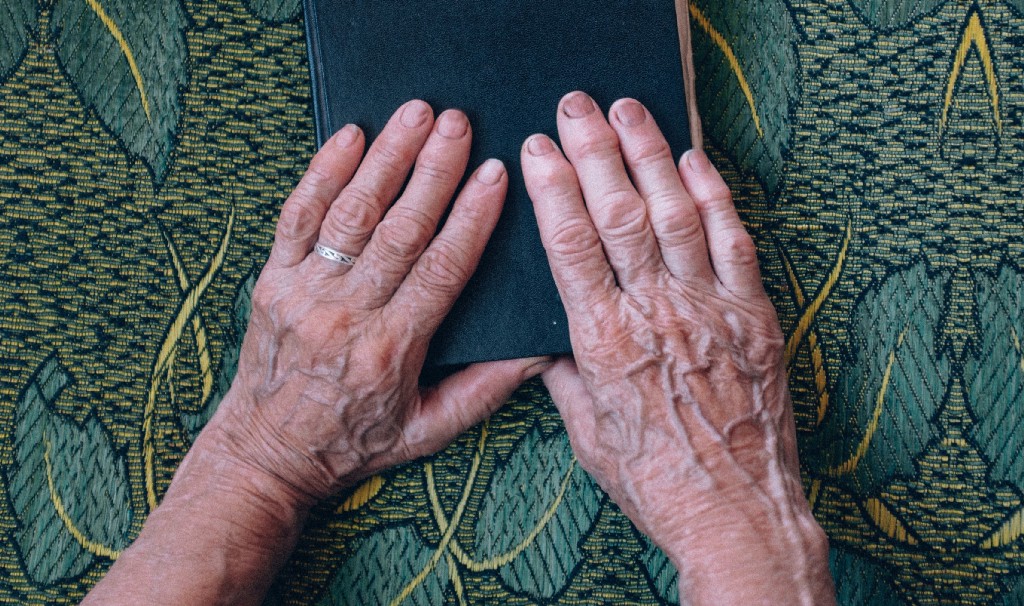Books & Culture
Everything I Needed To Know About My Aging Mother I Learned from Grace Paley
“My Father Addresses Me on the Facts of Old Age” taught me more than just the facts

Last year, my husband, Michael, and I went on a weeklong trip to Haiti with the high school where he teaches. Most nights, we pitched our bug huts — a kind of netted tent that provides protection against malaria-borne mosquitos — on the gritty ground of a second-floor, cinderblock classroom of St. Matthias, a school located in the heart of Thomonde. The voices of children rose and fell. Stray dogs barked. Roosters crowed. Someone played “Amazing Grace” on a slide trombone.
I tossed and turned, wishing for daylight. In an effort to find sleep, I reached for my iPhone and played music. When this didn’t work, I discovered the one podcast I had saved on my phone: A New Yorker fiction podcast with Allan Gurganus reading Grace Paley’s short story “My Father Addresses Me on the Facts of Old Age.”
During the episode, Gurganus talks about how Grace Paley was his first writing teacher at Sarah Lawrence in 1969. He was just off the USS Yorktown after serving a mandatory tour in the Navy during the Vietnam War. “Of course, Grace had devoted most of her adult life trying to end that war,” Gurganus says, “so, it was a weird combination of acceptance and forgiveness. She saw what I was trying to write… . I think her greatest inspiration was her fervent social-political belief that everybody is eloquent when telling their own story.”
The narrative structure of “My Father Addresses Me on the Facts of Old Age” revolves around four conversations between a father and a grown daughter in which he attempts to offer her advice about how to grow old. What emerges amid these sad, intimate conversations is a kind of familial dance of love, regret, and acceptance. I managed to fall asleep before Gurganus finished reading the masterful story. The following morning, the words I remembered were Paley’s opening lines: “My father decides to teach me the facts on how to grow old…. Please sit down, he said. Be patient. The main thing is this — when you get up in the morning, you must take your heart in your two hands. You must do this every morning.”
My mother has never been very good at giving advice. When I was 20 years old, she gave me an illustrated book about sex and masturbation, and said, I hope you have better luck with this than I did. It was the end of the summer, and I was getting ready for my final year of college. I didn’t know it at the time, but my mom and stepfather were on the verge of divorce, her combustible rage splitting apart the seams of their marriage. I flipped through the book, slipped it into a desk drawer, and never looked at it again.
When I was 20 years old, my mother gave me an illustrated book about sex and masturbation, and said, I hope you have better luck with this than I did.
My mother married again during her early sixties. Her third husband, John, was a former Olympic rower who watched Fox News and collected coupons. He passed away at age 89 during March of this year.
By age 65, my mother said that she wanted two things in life: a full-length mink coat and a face-lift. She managed to get both. I still wonder how this happened as John was the type of man who stole tea bags during the coffee hour after the church service and announced upon his return home, “I brought a present for you, dear.” Later, my mother said more than once during our conversations: They say it’s the golden years. Don’t believe them. It sucks.
When I was in my mid-thirties, I underwent two years of fertility treatments and chose not to tell my mother at the risk of being barraged with unsolicited advice. After Michael and I discontinued treatments with no medical diagnosis, I told my mother what we went through and our decision to stop trying. About six months later, my mom sent me an email. Have you tried this?!!! Don’t give up yet!!

There was a link to an article, explaining that if I kept my lower torso and legs elevated for a prolonged period of time after sex that it would improve my chances of getting pregnant. The email made me cry — more for my mother’s sadness and disappointment than my own, that she was still wishing that we could have children even though I was moving beyond my childbearing years. I called my mom and asked her not to send me any more emails about how to get pregnant. I’m never going to be a mother, I said to her. We tried. There is nothing to be done. For a moment, I almost enumerated all that Michael and I went through: the IUIs, the IVFs, the expenses, the disappointments, the lack of diagnosis. But I didn’t. It was still hard for me to understand all that happened. My mother said she was sorry, she wouldn’t bring it up again — and then, we both found an excuse to get off the phone.
“That’s a metaphor, right?” asks the daughter of the father in Paley’s story about his instructions of massaging the heart daily. “Metaphor! No, no, you can do this.”
In October of 2012, my mother suffered a nervous breakdown that landed her in one psychiatric ward after another. During the past six years, she has been a resident and a patient at multiple facilities, and undergone about thirty electroshock treatments. At one point, during all of this, I traveled to Michigan for ten days to help out. To pass the time, my mother and I played cards. It was early March, and the snow was falling. We sat in the living room of her home in a quiet suburb of Detroit. At the time John had been admitted to the hospital again and we were uncertain of when he might be discharged, and I was responsible with staying with my mom until he and his caregivers returned.

My mom sat down on the houndstooth loveseat in the television room. One of her feet constantly shook, and her thoughts circled wildly. I can’t do this. I have nowhere to go. Who is going to take care of me? Will you clean me if I soil myself? A blizzard howled into southern Michigan, the snow falling hour upon hour. In the backyard, a bright red cardinal hopped from branch to branch. The evergreen bushes were blanketed. As the steely daylight diminished, I shuffled the cards one more time and dealt another round. We played Gin Rummy for six hours straight on the living-room couch, my mom’s foot shaking, her sad eyes fixed on the fan of cards as she considered her next move. The Postman Always Rings Twice, with Lana Turner and John Garfield, played on the television in the corner, the sound muted. Don’t leave me, my mom said every fifteen minutes. Don’t go.
One of her feet constantly shook, and her thoughts circled wildly. I can’t do this. I have nowhere to go. Who is going to take care of me? Will you clean me if I soil myself?
Since my trip to Haiti, I’ve listened to the Gurganus/Paley podcast many times. The repetition of the story often produces a feeling of solace: the rolling Southern cadence and kindness of Gurganus’s voice, the awkward advice given by the father, how the character can never find the right words, the generous spirit of Paley and her rich storytelling voice. During his discussion with fiction editor Deborah Treisman, Gurganus refers to the story as a kind of “spirit dialogue” between father and daughter. “All of us have lost parents and close friends,” he says. “We have this ideal conversation that we run in our heads, wishing that it could finally transacted exactly the way that we wanted it to. And a part of the gorgeousness of the writing is that we finally get to set down the truth for other people to see and hear.”
My mother now resides in the nursing home in Detroit. Since being admitted, she has not left the facility once, not even for John’s funeral. Her days are mostly spent in bed. Occasionally, she stands up and walks into the hallway, watches television, maybe an old musical, like Singing the Rain, for a few fleeting moments before asking that she be escorted back to her room. A caregiver always assists her when she uses the bathroom. Our phone conversations last anywhere from fifteen seconds to two minutes; my mom is always anxious to get off. I need to go now, she says. Dinner is here — even if it’s not dinnertime.
During my sixteen years of living in New York City, I only saw Grace Paley once in person. Unfortunately, she wasn’t reading at the event. She was a member of the audience for a tribute honoring the poet Stanley Kunitz at Town Hall near Times Square. We were all there for the love of poetry, the love of words, and what words can illuminate during the darkest and the best of times. Poets, such as Marie Howe, Galway Kinnell, Sharon Olds, and Robert Pinsky, talked about the profound effect that Kunitz had on their lives and other poets. Poems were read and recited. Kinnell read “Halley’s Comet,” one of my favorites. The last stanza goes: I’m the boy in the flannel gown / sprawled on this coarse gravel bed / searching the starry sky / waiting for the world to end.
As Paley walked up the aisle, many admirers followed her. It was as if she were a rabbi, a beloved spiritual leader, or a member of the royal family.
After the event, a friend and I spotted Paley in the audience with her head of wiry white hair and playful grin. She wore a long black flowing coat. As she walked up the aisle, many admirers followed her. It was as if she were a rabbi, a beloved spiritual leader, or a member of the royal family. Paley’s five-foot, hunched-over being emanated a halo of goodwill and kindness. Gurganus comments in the podcast, “She was a mother of two and the adopted mother of forty thousand.”
Like most people, I have always sought wisdom and insight. The sources were many: literature, writing teachers, students, children. And now, Grace Paley. The words of that story have stayed with me. Hold your heart with two hands. You must never forget about your heart. It’s a great thing. Be patient. Find joy wherever you can. Love better.
My mother’s conversations exist in a continuous loop. Every time I call her at the nursing home, it’s variations on the same theme: I’m not doing well. I’m so lonely. I’m not going to make it. On some days, I long for the conversations that we used to have when she would ask me if I was safe from the latest tragedy in Texas (the fires in Bastrop, Hurricane Harvey, the church shooting in Sutherland Springs) or why I hadn’t finished my novel yet and when was she going to get to read it. Despite everything, I still long for her phone calls, her voice when it wasn’t saturated by chronic depression and anxiety. I miss the questions, criticisms, and gossip about my three older siblings. I miss the softening in her voice when she asked about my husband, his teaching and students. I miss the colorful holiday cards she used to send me with her signature smiley-face and “I love you” scribbled at the bottom. I miss her being the first person to call me on the morning of my birthday.
“My Father Addresses Me on the Facts of Old Age” was published in The New Yorker when Paley was 80 years old, five years before her death from breast cancer. The last time that Gurganus saw his beloved teacher was during a visit to Duke University. “I got to be with her for three days,” he remembers. “When we said goodbye, we said not goodbye. We just looked at each other for about two and half minutes while smiling. And that was it, that was all we needed to say.”
It was the early afternoon, and my flight from Detroit to Austin was scheduled to depart in a few hours. It was the end of my ten-day visit in March, and I couldn’t wait to leave the confines of my mom’s house. An invisible mold of sickness covered every inch of it. My mom sat on the blue couch in the small windowed sitting room on the second story. I bent down on my knees and trimmed her hardened yellowing toenails. Her skin was dry and calloused. She looked down at me. You and Michael, she said, you have a good marriage, don’t you? A love marriage? For a moment, her voice sounded like a clear bell, a different version of her old self. You’re lucky. Not everyone gets that. She’s right. I know I’m lucky. Twenty years of marriage, and I still feel lucky. Later, I will realize that this is my mother’s version of “Take your heart in your two hands…. You must never forget your heart.” I haven’t forgotten my heart — and somewhere deep inside herself, I don’t think my mother has forgotten hers either.










